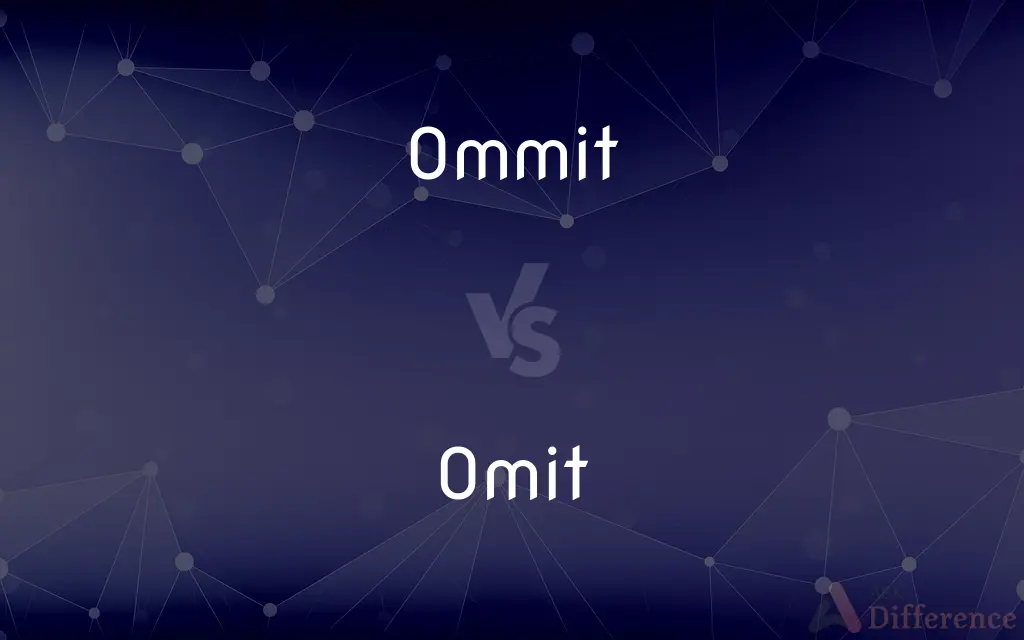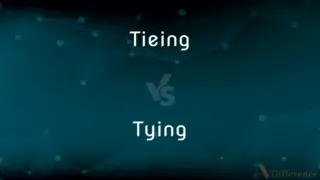Ommit vs. Omit — Which is Correct Spelling?
By Tayyaba Rehman — Updated on March 22, 2024
"Ommit" is a misspelling. The correct spelling is "Omit," which means to leave out or exclude.

Table of Contents
Which is correct: Ommit or Omit
How to spell Omit?

Ommit
Incorrect Spelling

Omit
Correct Spelling
ADVERTISEMENT
Key Differences
Picture the word "omit" omitting the extra "m."
Recall: “I omit the extra 'm'.”
Remember: one "m" in "Omit" and double "t" in "Commit."
"Omit" has the same number of letters as "edit"; both involve exclusion.
Think of "Omit" as "Oh, mitt" like a baseball mitt with just one "m".
ADVERTISEMENT
How Do You Spell Omit Correctly?
Incorrect: I need to ommit some details from the story.
Correct: I need to omit some details from the story.
Incorrect: Please ommit the unnecessary information from the report.
Correct: Please omit the unnecessary information from the report.
Incorrect: He decided to ommit that chapter from his book.
Correct: He decided to omit that chapter from his book.
Incorrect: It's important not to ommit any steps in the recipe.
Correct: It's important not to omit any steps in the recipe.
Omit Definitions
To neglect or bypass.
Don't omit any details in your explanation.
To fail to include or mention.
She omitted her middle name from the application.
To disregard or pass over.
The director omitted him from the final cast.
To leave out or exclude from consideration.
He decided to omit the last paragraph.
To fail to include or mention; leave out
Omitted an important detail from the report.
To fail or neglect to do (something)
Omitted his daily walk during our visit.
To fail or neglect (to do something)
I omitted to mention that I don't eat meat.
(transitive) To leave out or exclude.
(intransitive) To fail to perform.
To delete or remove; to strike.
To neglect or take no notice of.
To let go; to leave unmentioned; not to insert or name; to drop.
These personal comparisons I omit.
To forbear or fail to perform or to make use of; to leave undone; to neglect; to pass over.
Her father omitted nothing in her education that might make her the most accomplished woman of her age.
Prevent from being included or considered or accepted;
The bad results were excluded from the report
Leave off the top piece
Leave undone or leave out;
How could I miss that typo?
The workers on the conveyor belt miss one out of ten
To remove from a document or record.
The editor decided to omit the controversial line.
Omit Meaning in a Sentence
Teachers often omit difficult topics from the early curriculum.
The author chose to omit certain details to maintain suspense.
It's common to omit slang in formal writing.
Make sure to omit nuts from the recipe because of allergies.
Legal documents typically omit any ambiguous language.
To fit the time slot, the editor will omit several scenes.
You can omit the last step if you're short on time.
Remember to omit personal information when submitting online.
Some software allows you to omit specific data from searches.
In casual speech, people often omit the subject of the sentence.
Parents sometimes omit uncomfortable truths when talking to children.
Please omit dairy products from my meal.
Omit Idioms & Phrases
Leave out, not omit
A reminder that omitting something can be as significant as what is included.
In telling a story, what you leave out, not just what you omit, shapes the narrative.
Omit needless words
A principle of clear writing that suggests removing superfluous words.
Strunk and White's rule is to omit needless words for concise writing.
Omit to mention
To forget or intentionally not include information.
He omitted to mention that he had never climbed a mountain before.
Omit no detail
Ensure that every piece of information is included.
When recounting the story to the police, she was advised to omit no detail.
Safe to omit
Deemed unnecessary to include.
For a more casual look, it's safe to omit the tie.
Common Curiosities
Why is it called Omit?
The term "omit" comes from the Latin "omittere," meaning "to let go" or "send away."
What is the root word of Omit?
The root comes from the Latin "omittere."
What is the verb form of Omit?
The verb form is "omit."
What is the pronunciation of Omit?
It is pronounced as "o-MIT."
What is the plural form of Omit?
"Omits" is the plural form when referring to instances of omitting.
Is Omit an adverb?
No, "omit" is not an adverb.
Which vowel is used before Omit?
It can be either "an" or "a" depending on the context, e.g., "an omission" or "a omit."
Which article is used with Omit?
The article "an" or "a" can be used before "omit."
Is Omit a negative or positive word?
Neutral in itself, but can have a negative connotation when something crucial is left out.
What is the singular form of Omit?
"Omit" is the singular form.
Which conjunction is used with Omit?
Any conjunction can be used depending on the sentence.
Is the Omit term a metaphor?
No, but it can be used metaphorically.
Is the word Omit imperative?
It can be, as in "Please omit the last section."
What is a stressed syllable in Omit?
The second syllable, "mit", is stressed.
What part of speech is Omit?
"Omit" is a verb.
Which preposition is used with Omit?
"From" is often used, as in "omit from."
Is Omit a noun or adjective?
"Omit" is a verb.
What is the opposite of Omit?
Include.
Which determiner is used with Omit?
Determiners like "this," "that," "my," etc., can be used depending on the context.
Is Omit a vowel or consonant?
"Omit" is a word containing both vowels and consonants.
How many syllables are in Omit?
There are two syllables.
How do we divide Omit into syllables?
"O-mit."
What is the first form of Omit?
Omit.
Is Omit an abstract noun?
No, but "omission" (a related term) is.
What is another term for Omit?
Exclude.
What is the second form of Omit?
Omitted.
Is Omit a countable noun?
"Omit" is a verb, not a noun.
Is Omit a collective noun?
No, it's not.
What is the third form of Omit?
Omitted.
How is Omit used in a sentence?
Example: "Please omit any personal details from the public document."
Share Your Discovery

Previous Comparison
Ubiqitous vs. Ubiquitous
Next Comparison
Orginal vs. OriginalAuthor Spotlight
Written by
Tayyaba RehmanTayyaba Rehman is a distinguished writer, currently serving as a primary contributor to askdifference.com. As a researcher in semantics and etymology, Tayyaba's passion for the complexity of languages and their distinctions has found a perfect home on the platform. Tayyaba delves into the intricacies of language, distinguishing between commonly confused words and phrases, thereby providing clarity for readers worldwide.














































